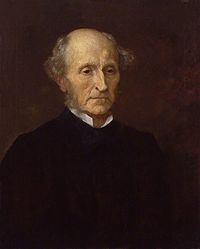Social liberalism
By the end of the nineteenth century, the principles of classical liberalism were being increasingly challenged by downturns in economic growth, a growing perception of the evils of poverty, unemployment and relative deprivation present within modern industrial cities, and the agitation of organized labor. The ideal of the self-made individual, who through hard work and talent could make his or her place in the world, seemed increasingly implausible.
A major political reaction against the changes introduced by industrialization and laissez-faire capitalism came from conservatives concerned about social balance, although socialism later became a more important force for change and reform. Some Victorian writers—including Charles Dickens, Thomas Carlyle, and Matthew Arnold—became early influential critics of social injustice.
John Stuart Mill contributed enormously to liberal thought by combining elements of classical liberalism with what eventually became known as the new liberalism. Mill’s 1859 On Liberty addressed the nature and limits of the power that can be legitimately exercised by society over the individual. He gave an impassioned defense of free speech, arguing that free discourse is a necessary condition for intellectual and social progress. Mill defined “social liberty” as protection from “the tyranny of political rulers.” He introduced a number of different concepts of the form tyranny can take, referred to as social tyranny, and tyranny of the majority respectively. Social liberty meant limits on the ruler’s power through obtaining recognition of political liberties or rights and by the establishment of a system of “constitutional checks.”
However, although Mill’s initial economic philosophy supported free markets and argued that progressive taxation penalized those who worked harder, he later altered his views toward a more socialist bent, adding chapters to his Principles of Political Economy in defense of a socialist outlook, and defending some socialist causes, including the radical proposal that the whole wage system be abolished in favor of a co-operative wage system.
Another early liberal convert to greater government intervention was Thomas Hill Green. Green regarded the national state as legitimate only to the extent that it upholds a system of rights and obligations that is most likely to foster individual self-realization.
This strand began to coalesce into the social liberalism movement at the turn of the twentieth century in Britain. The New Liberals, which included intellectuals like L.T. Hobhouse, and John A. Hobson, saw individual liberty as something achievable only under favorable social and economic circumstances. In their view, the poverty, squalor, and ignorance in which many people lived made it impossible for freedom and individuality to flourish. New Liberals believed that these conditions could be ameliorated only through collective action coordinated by a strong, welfare-oriented, and interventionist state.
The People’s Budget of 1909, championed by David Lloyd George and fellow liberal Winston Churchill, introduced unprecedented taxes on the wealthy in Britain and radical social welfare programs to the country’s policies. It was the first budget with the expressed intent of redistributing wealth among the public.

2 replies on “Liberalism, 11”
“Until Whites get rid of universal morality
they will be forever lost.”
As some wise sage once said, “liberalism is a collective racial death wish.”
I saw these two comments on quotes….. while the upper one is completley right……. the below one i would like to add my own
Liberals are western europeans who wish to be Russians.
They do wish to be slightly inferior and as this is not possible they make the country vastly inferior instead.
Liberalism would not work in Russia because the russians would take it seriously..
Liberals are a personal phenomena, not merely a apersonal phenomena that could arise everywere… Liberals are a product of the orientalisation of society… of the east coming west.
Liberals want all non-mediocrity criminalised…
they want womens merely to smile instead of having sex.